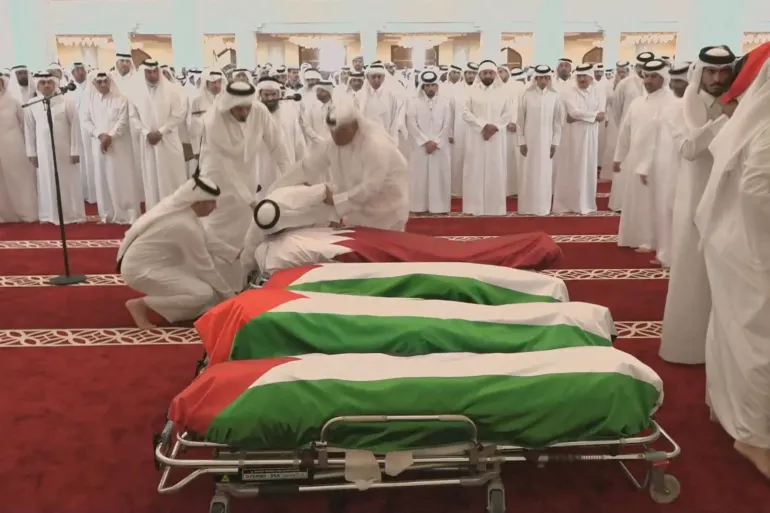After Shock Israeli Attack Doha Residents Grapple With Fear and Uncertainty

Doha, Qatar – Six coffins, five draped in Palestinian flags and one in the maroon and white of Qatar, were laid before a packed congregation at the Imam Muhammad ibn Abd al-Wahhab Mosque. Standing in the front row was Qatar’s Emir, Sheikh Tamim bin Hamad Al Thani, paying respects to those killed in an unprecedented Israeli drone strike in the heart of Doha.
Among the dead was 22-year-old Lance-Corporal Badr Saad Mohammed al-Humaidi al-Dosari, a Qatari Internal Security Forces member. His death, along with five Hamas members, came during an Israeli airstrike targeting a Hamas meeting held in a residential villa in the upscale West Bay Lagoon area — an attack that has left residents stunned and deeply unsettled.
The Tuesday strike, carried out in broad daylight, marked the first direct military assault on Qatari soil in the nation’s modern history. For many, the very idea of such an attack within the capital was once unthinkable.
Mohammed Asim, a 40-year-old food wholesaler from Bangladesh, lives less than a kilometre from the blast site. “I thought a house was being demolished,” he said. “Only after seeing the news did I realize what had happened.”
Emergency crews responded quickly, while drones hovered over the compound late into the evening, illuminating the debris-strewn courtyard with their searchlights. The air around the scene was thick with smoke and tension, as officials sealed off surrounding roads and families peeked from windows, unsure if the threat had truly passed.
The targeted building was reportedly used by members of Hamas’s political bureau, who were discussing a U.S.-brokered proposal for a Gaza ceasefire at the time. While the intended targets survived, the attack claimed civilian and security lives and sent shockwaves through a city known for its calm and neutrality in the region’s conflicts.
In the days since, regional leaders have poured into Doha, offering condolences and pledging solidarity. Notable among them were UAE President Mohammed bin Zayed Al Nahyan and Pakistani Prime Minister Shehbaz Sharif. Even U.S. President Donald Trump weighed in, describing the attack as unacceptable and promising such strikes would not happen again — though he maintained that “eliminating Hamas” remained “a worthy goal.”
But among Doha’s residents, that reassurance has done little to ease the prevailing sense of vulnerability.
“Israel behaves however it wants, and after a bit of harsh language, things go back to before,” said a local man who identified himself only as Mohammed. “We’ll see what Trump actually does.”
The unease in the city is visible — from the increased security presence to the billboards across the capital carrying messages of resilience. At the City Centre Mall in West Bay, a massive sign bears the words of the Prophet Abraham: “Our Lord, make this land secure.”
For a city that has long served as a mediator in regional conflicts — and hosts a major U.S. airbase — the Israeli strike represents a dangerous escalation. What was once a distant war in Gaza has, for many Qataris and residents alike, come crashing violently to their doorstep.
Now, the question many in Doha are quietly asking: Is this the beginning of something far more dangerous — or just a warning shot in a conflict that knows no borders?



